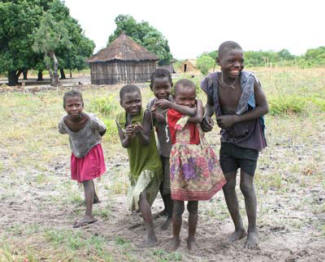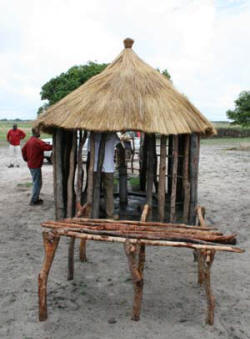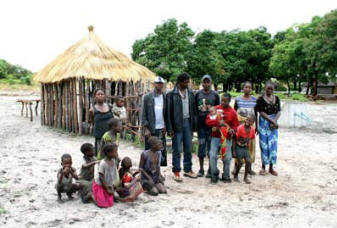|
Mambwa, Zambia
In
June 2008 the Drinking Fountain Association most generously
donated £500 towards the work of Village Water; providing wells,
sanitation equipment and hygiene education to rural communities
in Zambia.
 I
am writing to provide the trustees with a report of the work
undertaken by Village Water as a result of this donation. I
am writing to provide the trustees with a report of the work
undertaken by Village Water as a result of this donation.
In the 2007/08 United Nations Human
Development Report, Zambia was ranked 165th out of 177 countries
in the Human Development Index. The main causes of death, apart
from HIV/AIDS, are infectious diseases that are entirely
preventable or easily treatable. Disease coupled with economic
challenges, food shortages and lack of access to clean water and
sanitation, has left over half of Zambian children suffering
from malnutrition.

The donation made by the Drinking
Fountain Association was used as a contribution towards the cost
of a well and sanitation programme in Mambwa in the Western
Province of Zambia. This well is currently benefiting 200
people. The residents of Mumbwa are excited to have the new
well. You will see the picture I have included of the children
of the village. Before the well was installed they walked for
two hours each day with their mothers to collect dirty water
from a small open waterway.
The
main house you can see in the pictures shelters the new water
well & pump from the weather and wandering animals. The annexe
you can see protects the surplus water soakaway where they will
plant a banana tree. To the other side of the main house is a
pots & pans drying rack for use when washing up after cooking
and eating.
The village now, as well as having a
well and sanitation equipment, has formed a Water & Sanitation
Committee. Every working adult is paying 10 pence (in local
currency) per month to ensure the well is maintained for
perpetual use.
 Once
the well was put in place, the Community-Led Total Sanitation
Programme took place. Villagers were educated in good hygiene
practice and shown the benefits of self-help sanitation.
Following on from this, with Saturday as a designated workday,
villagers were shown how to dig their own pit latrines (toilets)
and build hand washing stands. In addition community workers
were able to show the villagers how to make and erect vegetable
and plate racks to keep cooking utensils, dinner plates and food
off the ground – and away from village dogs. Likewise, the
families were taught to dig refuse disposal pits and build bath
shelters to encourage washing. Once
the well was put in place, the Community-Led Total Sanitation
Programme took place. Villagers were educated in good hygiene
practice and shown the benefits of self-help sanitation.
Following on from this, with Saturday as a designated workday,
villagers were shown how to dig their own pit latrines (toilets)
and build hand washing stands. In addition community workers
were able to show the villagers how to make and erect vegetable
and plate racks to keep cooking utensils, dinner plates and food
off the ground – and away from village dogs. Likewise, the
families were taught to dig refuse disposal pits and build bath
shelters to encourage washing.
To ensure sustainability after
installation, two villagers were trained to safely and
effectively carry out all basic maintenance on the well. To
complement this, a local Pump Minders, who is able to fix more
technical problems, looks after the village well. The monthly
subscription fee, set up by the villagers when the well is
installed, pays for any repairs.
Plentiful supplies of clean water and sanitation equipment have
show immense, long-lasting effects
-
Children can wash regularly – avoiding the diseases caused
by insufficient water.
-
Families no longer go hungry as the water grows plentiful
supplies of nourishing food.
-
Families can produce two or three crops per year instead of
the one crop enabled by the natural climate. Any extra food
can be sold at local markets to pay the school fees of the
village children.
With
the support of the Drinking Fountain Association in
collaboration with Village Water, the villagers of Mambwa have
now been given the tools to lift themselves out of poverty.
|

